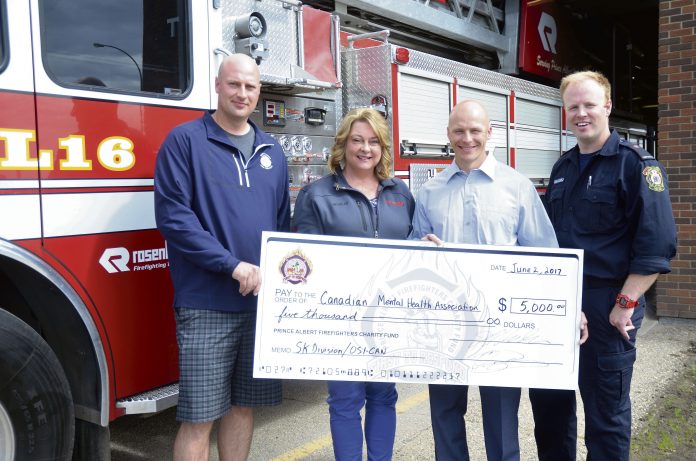
When the Prince Albert Firefighters Association saw the work Michelle McKeaveny and OSI-CAN were doing to support people with PTSD and operational stress injuries (OSI) in the community, they knew they wanted to help.
They did so in a big way Friday, announcing a $5,000 donation to the program.
The support program provides a support group for first responders, veterans, nurses, prison guards and more where they can discuss their symptoms and provide mutual support.
It has been operating for a year in P.A., and according to McKeaveney, the popularity of the program shows how necessary it is.
McKeaveney herself suffers from an OSI, so she knows what it’s like to go through those struggles.
“This is why I want to help people,” she said. “I didn’t talk about my OSI when it happened to me in 2005. I put myself back together and got back to work, and then in 2010 I started to lose my sight suddenly. It all stems from the fact that I never dealt with my stress injury. That was pretty profound, when your body starts breaking down.”
From her own experience, and from seeing the effects of PTSD and OSI in others in the community, McKeaveney knew she had to do something.
“I’ve been a counsellor and a social worker and a guard for a lot of years in this community,” she said.
“I’ve seen a lot of marriages end and a lot of messed up families because the person wearing the uniform didn’t think they could talk or should talk. We need to talk. We need to share so we can retire happy.”
The firefighters involved with Friday’s announcement agreed. A big part of the reason they donated to the cause is they see the way it’s helping their own peers.
Chris Bourdon, the firefighters association president, thanked McKeaveney for the work she has done putting the group together.
“We have active members and retired members who are actively using this group,” he said. “We are very, very proud to help out and do what we can. We couldn’t be happier to make this donation … for our own members, as well as other members in Prince Albert who want to seek out help, whether it’s a pen guard, or a jail guard, or a firefighter, or a police officer, or a veteran, we want to make sure there are resources available to make sure they get the help they need.”
While Bourdon supported the donation, the idea came from a second firefighter, Jeff Reeder.
Reeder stressed the symptoms of PTSD or OSI can hit at any time.
“It’s not just one incident, it’s the accumulation of a number of calls over years, and years, and years,” he said.
“Our bodies are only meant to handle so much. We’re human beings. It’s important to know yourself when you need to access help and other resources.”
He compared it to having a broken leg.
“You go to the doctor to get it fixed. Your brain is no different. When your brain needs to be repaired, you go to places like this, or you see your doctor or access other resources to help yourself get better.”
Reeder said a key reason for the donation was to ensure people know that they have supports available.
“Active members, as well as retired, feel like as soon as they leave this building, their support network is cut off, but that couldn’t be more wrong,” he said. “We want to ensure everybody has access to this.”
The donation will help ensure the support group keeps operating in the community. “So many great things get started, but then it’s always a funding thing,” McKeaveney said. “They always end up ending. This is one thing we need to continue.”
Bourdon agreed.
‘There has been a push for mental health and an increased level of mental health help over the years since I started my career. However, firefighters, paramedics and police officers in the past have been told to man up and shut it out. I’m not sure if that has gotten any better,” he said.
“We all say that mental health is important, but it’s a killer you don’t see. We’re working towards getting better. We have to be better at it, but we still have a long way to go. We need to do better, and we need to have better support networks.”

